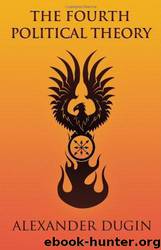The Fourth Political Theory by Alexander Dugin

Author:Alexander Dugin
Language: eng
Format: azw3, epub
Tags: lit_guide
ISBN: 9781907166655
Publisher: Arktos
Published: 2012-07-15T04:04:38.866426+00:00
The New Left (Anti-Globalism, Postmodern Paths, Labyrinths of Freedom, to the Advent of Post-humanity)
More than anything today, that which is called the ‘New Left’ (neo-Gauchism) or ‘postmodernism’ fits the word combination ‘Leftist project’. Amidst the whole spectrum of Leftist ideas at the start of the Twenty-first century, precisely this orientation is not only the most bright and blazing, but also the most thought out, intellectually adjusted and systematised.
New Leftists appeared in the 1950s and 1960s in Europe on the periphery of the Leftist flank of Marxists, Trotskyites and anarchists. Marx was the sine qua non[217] for them, but they also actively used other theoretical and philosophical sources, in contrast to the ‘Old Leftists’, bringing imported elements into their own theory without disturbance. For that reason, Marxism in this form actively broadened, while constantly juxtaposing with other philosophical conceptions, developed itself, rethought itself, subjected itself to criticism — in short, became an object of concentrated reflection. Such an unrestricted relation of the New Left to Marxism produced two results: on one hand, it became diluted; on the other, it modernised essentially.
The ‘philosophers of suspicion’, drawing not only on Marx but also on Freud and Nietzsche, exerted a great influence upon the philosophy of the New Leftists. Through Sartre, one of the classic theorists of the New Leftists, the deep influence of Martin Heidegger and the existential problem penetrated into the Leftist movement. Structuralism had a colossal significance, from the most important theoreticians of structuralism, Ferdinand de Saussure to Levi-Strauss. In a philosophical sense, New Leftists were themselves structuralists, while in the second half of the 1980s, developing this philosophical impulse further, they moved on to ‘post-structuralism’, having exposed to systematic critical reflection their own views of the 1960s and 1970s.
The New Leftists approached Marxism from a structuralist position — that is, they thought that Marx’s most important idea of Marx’s concerned the fundamental influence of understructures (in the usual case, bourgeois society, carefully hidden from ideological consciousness) in relation to a superstructure. The Marxist analysis of ideology as ‘false consciousness’ became, for the New Leftists, the key to the interpretation of society, philosophy, man and the economy. But that same train of thought they discovered from Nietzsche, who had raised the whole spectrum of philosophical ideas to the primordial ‘will to power’ (this was its very basis, according to Nietzsche), and from Freud, for whom the base was the subconscious and unconscious impulses, rooted in the mineral foundations of man’s sexuality and the habitual structures that form in early childhood. To this was added the Heideggerian model, where the base is the fact of pure existence, Dasein. All the various decipherings of the ‘base’ were aggregated by the New Leftists into a general scheme, where the role of ‘the base’ as such — regardless of a concrete philosophical tendency — was carried over into the notion of structure. Structure — that is, simultaneous industrial forces reproduced in industrial relations, the subconscious, ‘the will to power’, and Dasein.
Download
The Fourth Political Theory by Alexander Dugin.epub
This site does not store any files on its server. We only index and link to content provided by other sites. Please contact the content providers to delete copyright contents if any and email us, we'll remove relevant links or contents immediately.
The Secret History by Donna Tartt(19025)
The Social Justice Warrior Handbook by Lisa De Pasquale(12182)
Thirteen Reasons Why by Jay Asher(8883)
This Is How You Lose Her by Junot Diaz(6869)
Weapons of Math Destruction by Cathy O'Neil(6260)
Zero to One by Peter Thiel(5782)
Beartown by Fredrik Backman(5733)
The Myth of the Strong Leader by Archie Brown(5491)
The Fire Next Time by James Baldwin(5422)
How Democracies Die by Steven Levitsky & Daniel Ziblatt(5210)
Promise Me, Dad by Joe Biden(5139)
Stone's Rules by Roger Stone(5078)
A Higher Loyalty: Truth, Lies, and Leadership by James Comey(4946)
100 Deadly Skills by Clint Emerson(4911)
Rise and Kill First by Ronen Bergman(4775)
Secrecy World by Jake Bernstein(4737)
The David Icke Guide to the Global Conspiracy (and how to end it) by David Icke(4696)
The Farm by Tom Rob Smith(4500)
The Doomsday Machine by Daniel Ellsberg(4480)
